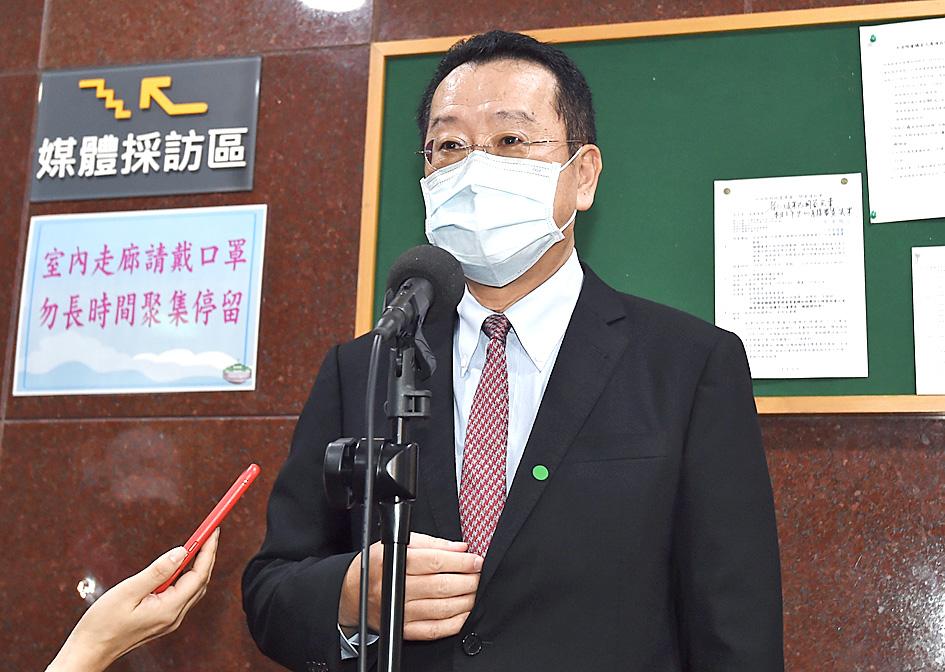The Financial Supervisory Commission (FSC) and the central bank reached an agreement allowing local companies to open offshore banking unit (OBU) accounts at domestic banks to borrow foreign currency funds, FSC Chairman Wellington Koo (顧立雄) said yesterday.
Koo, who is to leave his post to serve as secretary-general of the National Security Council, told a meeting at the Legislative Yuan that he has proposed deregulation since November last year and reached an agreement with the central bank.
The two agencies are to discuss whether to limit the amount of foreign currency-denominated lending, Koo said.

Photo: Chien Jung-fong, Taipei Times
FSC Vice Chairman Huang Tien-mu (黃天牧), who is to become chairman tomorrow, would announce when the deregulation will take effect, Koo said.
Up to 90 percent of Taiwan-based companies have set up branches or paper companies overseas so they could open accounts at OBUs without breaching the Offshore Banking Act (國際金融業務條例), which only allows overseas companies and individuals to open OBU accounts that accept foreign currency deposits, Koo said.
“It is fine for big companies [to do that], as they have overseas operations, but for most small and medium-sized enterprises, [pretending to] be foreign companies is like sailing under false colors,” he said.
Meanwhile, it has become more difficult for local companies without a real overseas business to register a foreign company after Taiwan last year implemented the Common Reporting Standard, which regulates the automatic exchange of information regarding financial accounts on a global level, Koo said.
“Given that Taiwanese companies’ registrations might not be approved abroad, why do we not let them return and open accounts under our supervision?” he said.
It would be more convenient for the regulators to monitor the companies’ real beneficiaries, too, he said.
The deregulation is expected to help domestic firms manage their foreign funds more conveniently and boost local banks’ wealth management business, Koo said.
The deregulation does not need to amend the existing law, as the Offshore Banking Act allows such operations, but banks’ OBUs do not provide foreign currency funds to domestic firms because regulators do not encourage them to do so, he said.
The move would likely boost corporate lending in foreign currencies, a privately owned bank’s vice senior president told the Taipei Times by telephone on condition of anonymity.
“Local companies wanted to open OBU accounts to borrow US dollars, as they face many restrictions when applying for US dollar-denominated loans domestically,” the manager said.
The central bank, out of concern over fluctuations in foreign exchange rates, requires borrowers to submit documents such as transactions with foreign clients to show why they need foreign currency funds and file repayment plans, he said.
It would be much more convenient if local companies could directly borrow US dollars through OBU accounts, he said, adding that there would be no foreign exchange risks if companies receive US dollars from foreign clients.

In Italy’s storied gold-making hubs, jewelers are reworking their designs to trim gold content as they race to blunt the effect of record prices and appeal to shoppers watching their budgets. Gold prices hit a record high on Thursday, surging near US$5,600 an ounce, more than double a year ago as geopolitical concerns and jitters over trade pushed investors toward the safe-haven asset. The rally is putting undue pressure on small artisans as they face mounting demands from customers, including international brands, to produce cheaper items, from signature pieces to wedding rings, according to interviews with four independent jewelers in Italy’s main

Japanese Prime Minister Sanae Takaichi has talked up the benefits of a weaker yen in a campaign speech, adopting a tone at odds with her finance ministry, which has refused to rule out any options to counter excessive foreign exchange volatility. Takaichi later softened her stance, saying she did not have a preference for the yen’s direction. “People say the weak yen is bad right now, but for export industries, it’s a major opportunity,” Takaichi said on Saturday at a rally for Liberal Democratic Party candidate Daishiro Yamagiwa in Kanagawa Prefecture ahead of a snap election on Sunday. “Whether it’s selling food or

CONCERNS: Tech companies investing in AI businesses that purchase their products have raised questions among investors that they are artificially propping up demand Nvidia Corp chief executive officer Jensen Huang (黃仁勳) on Saturday said that the company would be participating in OpenAI’s latest funding round, describing it as potentially “the largest investment we’ve ever made.” “We will invest a great deal of money,” Huang told reporters while visiting Taipei. “I believe in OpenAI. The work that they do is incredible. They’re one of the most consequential companies of our time.” Huang did not say exactly how much Nvidia might contribute, but described the investment as “huge.” “Let Sam announce how much he’s going to raise — it’s for him to decide,” Huang said, referring to OpenAI

The global server market is expected to grow 12.8 percent annually this year, with artificial intelligence (AI) servers projected to account for 16.5 percent, driven by continued investment in AI infrastructure by major cloud service providers (CSPs), market researcher TrendForce Corp (集邦科技) said yesterday. Global AI server shipments this year are expected to increase 28 percent year-on-year to more than 2.7 million units, driven by sustained demand from CSPs and government sovereign cloud projects, TrendForce analyst Frank Kung (龔明德) told the Taipei Times. Demand for GPU-based AI servers, including Nvidia Corp’s GB and Vera Rubin rack systems, is expected to remain high,